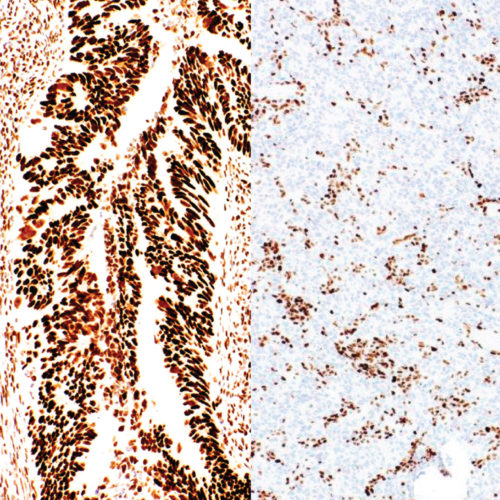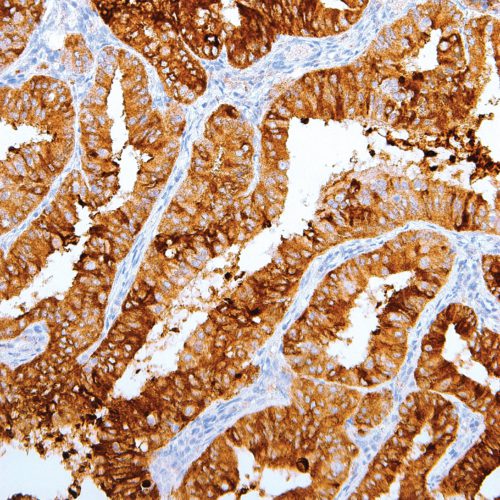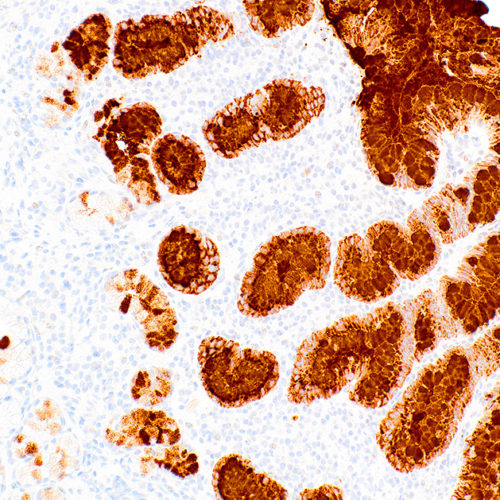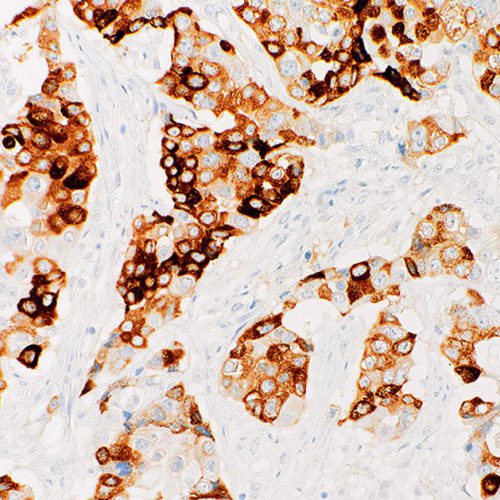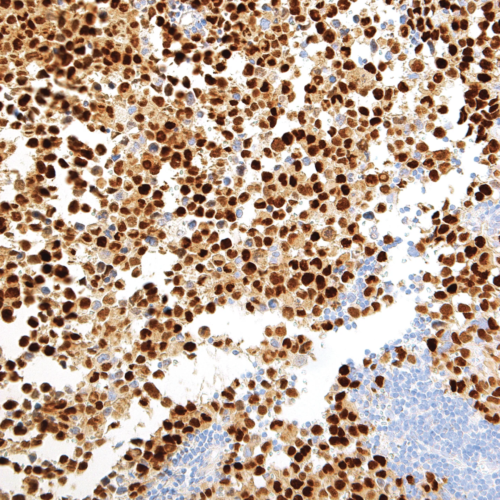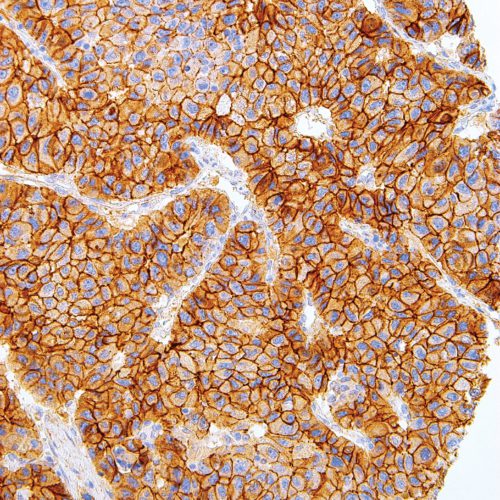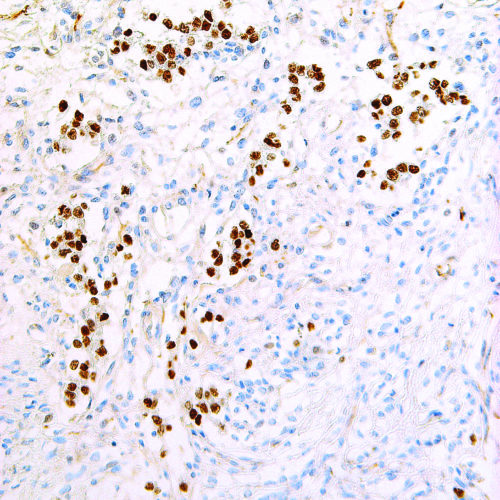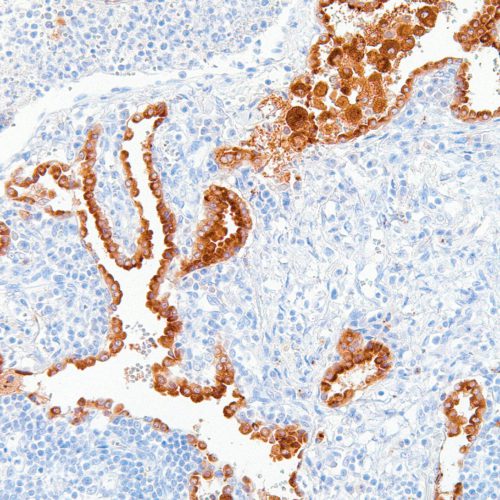High quality products to support Pathologists and Biological and Environmental Scientists
GeneAb™ MSH6
$110.00 – $530.00MutS Homolog 6 (MSH6) is a protein involved in the mismatch repair pathway. This protein is commonly associated with hereditary non-polyposis colorectal cancer, and mutations in this gene are correlated with the development of sporadic colorectal carcinoma. Studies have shown that mutations in MSH6, when co-indicated with mutations in MSH1 and MSH2, contribute to the development of sporadic colorectal carcinoma. Use of Anti-MSH2 is optimized when paired with MSH6, MLH1, and PMS2 in an IHC panel.
GeneAb™ MUC1
$80.00 – $300.00Mucin 1 (MUC1) is a membrane-bound glycoprotein involved in a number of protective and cell-signaling functions, including cell-cell adhesion, proliferation, motility, invasion, and survival. Overexpression of MUC1 is clinically indicated in breast carcinomas, papillary thyroid carcinomas, and thymic carcinomas, and reports have named MUC1 as a useful marker for differentiating thymic carcinoma from type B3 thymoma. The expression of MUC1 is correlated with the grade of malignancy in thymic epithelial tumors, and loss of MUC1 expression has been associated with reactive gastropathy. MUC1 is not expressed in normal human epidermis, but has been detected in the epidermis of psoriatic plaques of biopsies from patients diagnosed with psoriasis vulgaris.
GeneAb™ MUC5AC
$75.00 – $300.00Mucin 5AC (MUC5AC) is a secretory-type mucin found in columnar mucous cells of surface gastric epithelium and in goblet cells of the fetal and precancerous colon, but not in normal colon cells. MUC5AC expression is indicated in carcinomas wherein the type is defined as diffuse and infiltrative, and those located mainly in the antrum. Studies have also suggested a correlation between MUC5AC and colorectal signet-ring cell carcinoma, with overexpression of MUC5AC relating to the carcinogenesis, malignant potential, progression, and clinical behaviors.
GeneAb™ MUC6
$75.00 – $280.00Mucin 6 (MUC6) is a glycoprotein expressed in mucous neck cells, pyloric glands of the antrum, epigastric and bronchial epithelium, and in Müller ducts of the endocervix and urethral epithelium. Anti-MUC6 is useful for differentiating fetal, precancerous, and cancerous colonic mucosa from normal colon, as the antibody does not stain the latter. Anti-MUC6 stains the gastric epithelial surface of normal human gastrointestinal tract.
GeneAb™ Myogenin
$95.00 – $380.00Myogenin belongs to a family of myogenic transcription factors, including MyoD, myf5, and MRF4, which are critical in muscle development. Myogenin is found strictly in cells of skeletal muscle origin, and is therefore used as a biomarker for tumors of the muscle lineage, including alveolar rhabdomyosarcomas. Anti-Myogenin staining may occur in Wilms’ tumor, and labels the nuclei of myoblasts in developing muscle tissue. It is also expressed in some leiomyosarcomas.
GeneAb™ N-cadherin
$210.00 – $980.00N-cadherin, also known as Cadherin-2 (CDH2) or Neural Cadherin (NCAD), is a transmembrane cell adhesion molecule that was originally detected in nervous tissue. It plays an important role in embryogenesis, being involved in gastrulation and neural crest development. N-cadherin is found is cancer cells and allows for transendothelial migration, which is a critical process in the metastasis of cancer. Overexpression and disorderly arrangement of N-cadherin has been noted in dilated cardiomyopathy. It has been suggested that, when considered in adjunct with the status of a number of additional cell-cell adhesion molecules, missense mutations in N-cadherin may be a potential indicator of obsessive-compulsive disorder and Tourette disorder.
GeneAb™ Nanog
$100.00 – $405.00Nanog is a homeoprotein that functions with pluripotent factors such as Oct4 and Sox2 to maintain embryonic stem cell pluripotency. Expression of this protein has been noted in seminoma, dysgerminoma, embryonal carcinoma, and other undifferentiated germ cell tumors, while nanog expression is absent in normal adult organ tissues. Anti-Nanog may be useful in distinguishing between undifferentiated germ cell tumors and non-germ cell tumors.
GeneAb™ Napsin A
$70.00 – $275.00Napsin A is a pepsin-like aspartic proteinase, closely related to Napsin B, expressed mainly in the lung and kidney and which is involved in the correct folding, targeting, and control of aspartic proteinase zymogens. Napsin A expression has been indicated in type II pneumocytes and adenocarcinomas of the lung and kidney. Anti-Napsin A is also useful for differentiating between primary lung adenocarcinomas and adenocarcinomas of other organs, due to the high specificity expression of Napsin A in adenocarcinomas of the lung.
